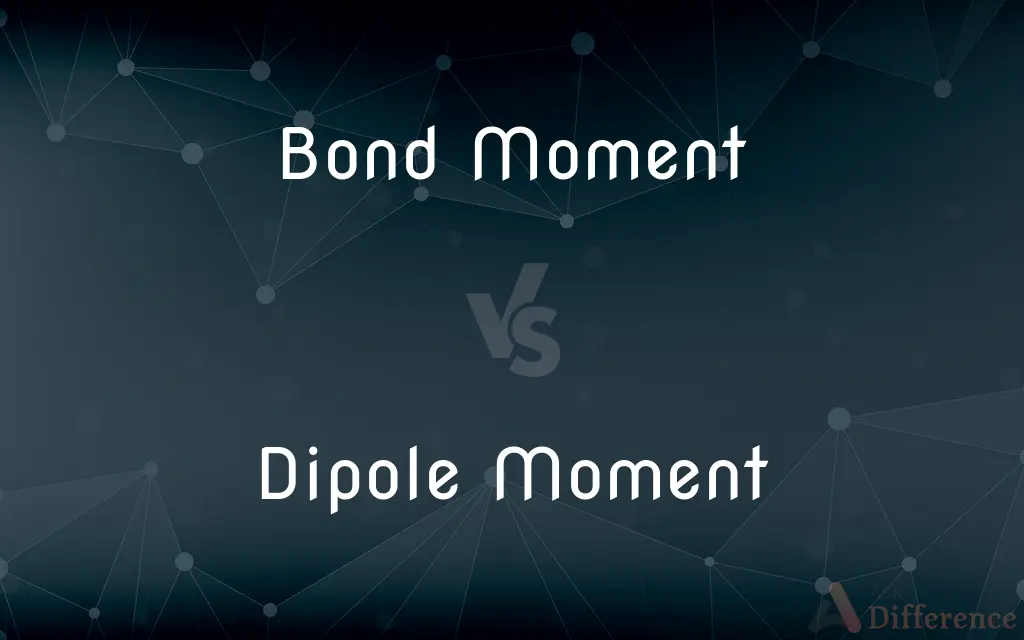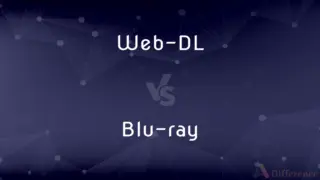Bond Moment vs. Dipole Moment — What's the Difference?
By Urooj Arif & Fiza Rafique — Published on February 27, 2024
A bond moment is the polarity of a single chemical bond in a molecule, reflecting the electronegativity difference between two atoms. A dipole moment measures the overall polarity of a molecule, indicating the separation of positive and negative charges.

Difference Between Bond Moment and Dipole Moment
Table of Contents
ADVERTISEMENT
Key Differences
Bond moment and dipole moment are fundamental concepts in chemistry related to the distribution of electrical charge within molecules. The bond moment, often described in terms of bond polarity, arises from the difference in electronegativity between two bonded atoms. This difference leads to an unequal sharing of electrons, with the more electronegative atom pulling the shared electrons closer to itself, thus creating a partial negative charge (δ-) on that atom and a partial positive charge (δ+) on the less electronegative atom.
The dipole moment, on the other hand, is a vector quantity that represents the overall polarity of a molecule. It is determined by the sum of all the individual bond moments in the molecule, taking into account both the magnitude and direction of each bond moment. The dipole moment is measured in Debye units and provides insight into the molecule's behavior in an electric field, which is crucial for understanding interactions like hydrogen bonding, solubility, and reactivity.
The bond moment focuses on the polarity of individual bonds, while the dipole moment considers the molecule as a whole. For instance, a molecule with multiple polar bonds might still have a zero dipole moment if the geometry of the molecule allows for the bond moments to cancel each other out, resulting in a non-polar molecule. Conversely, a molecule with only one polar bond will have a dipole moment that is essentially the same as that bond's bond moment.
The bond moments and dipole moments are related, but they provide different levels of insight into the molecular structure and its electrical properties. Bond moments help in understanding the distribution of charge across a bond, whereas the dipole moment gives a comprehensive view of the molecule's overall polarity.
Comparison Chart
Definition
Polarity of a single chemical bond
Overall polarity of an entire molecule
ADVERTISEMENT
Measurement
Electronegativity difference
Vector sum of bond moments
Units
Partial charges (δ+ and δ-)
Debye (D)
Indicates
Electronegativity difference between two atoms
Separation of positive and negative charges in a molecule
Relevance
Specific bond analysis
Whole molecule behavior
Compare with Definitions
Bond Moment
Critical for understanding the polarity of individual bonds.
Bond moments help predict the behavior of bonds in chemical reactions.
Dipole Moment
Measures the overall polarity of a molecule, accounting for all bond moments.
Water's dipole moment results from its bent geometry and polar O-H bonds.
Bond Moment
Can be present even in overall non-polar molecules due to molecular geometry.
CO2 has polar C=O bonds, but the molecule is non-polar due to its linear shape.
Dipole Moment
Determines how a molecule interacts with electric fields and other molecules.
Molecules with high dipole moments have stronger intermolecular forces.
Bond Moment
Reflects the polarity of a specific chemical bond due to electronegativity differences.
The bond moment between H and Cl in HCl indicates its polar nature.
Dipole Moment
Expressed in Debye units, reflecting the molecule's charge distribution.
A higher dipole moment indicates a more polar molecule.
Bond Moment
Assessed by comparing the electronegativity of two bonded atoms.
The greater the electronegativity difference, the higher the bond moment.
Dipole Moment
Influences molecular interactions and properties like solubility and boiling points.
Substances with high dipole moments tend to be soluble in polar solvents.
Bond Moment
Influences the physical properties of substances.
Bond moments affect boiling points and solubility.
Dipole Moment
Can be zero even in molecules with polar bonds if the geometry allows for cancellation.
Carbon tetrachloride (CCl4) is non-polar despite having polar C-Cl bonds.
Common Curiosities
How is the dipole moment of a molecule measured?
The dipole moment is measured in Debye units, which quantify the separation of charge within the molecule.
Why is the bond moment important in chemistry?
Understanding bond moments helps predict the polarity and behavior of individual chemical bonds.
Does the dipole moment affect a molecule's physical properties?
Yes, the dipole moment influences properties like boiling point, solubility, and reactivity.
What determines a bond moment?
A bond moment is determined by the difference in electronegativity between two bonded atoms.
Can a molecule have a zero dipole moment with polar bonds?
Yes, if the molecular geometry allows for the bond moments to cancel each other out.
What does a high dipole moment indicate about a molecule?
A high dipole moment indicates a significant separation of charge, making the molecule highly polar.
Is it possible for a non-polar molecule to contain polar bonds?
Yes, non-polar molecules can contain polar bonds if the molecular geometry allows those bond moments to cancel out, resulting in no overall dipole moment.
How does electronegativity relate to bond moments?
Electronegativity differences between atoms create bond moments, with larger differences resulting in more polar bonds.
Can the dipole moment predict molecular interactions?
Yes, molecules with similar dipole moments are likely to interact strongly due to similar polarities.
What role does molecular geometry play in dipole moments?
Molecular geometry determines how bond moments combine, affecting the overall dipole moment.
What role does the bond moment play in predicting the outcome of chemical reactions?
The polarity of bonds, indicated by bond moments, can influence reactivity and the direction of chemical reactions by affecting electron distribution.
Can a molecule's dipole moment impact its electrical conductivity?
While dipole moments primarily influence interactions in non-conductive solutions, the polarity can affect how molecules align in an electric field, indirectly influencing conductivity in complex systems.
How do bond moments contribute to the dipole moment?
The dipole moment is the vector sum of all individual bond moments, considering both magnitude and direction.
How do bond and dipole moments differ in their relevance?
Bond moments assess individual bonds, while dipole moments provide insight into the whole molecule's polarity.
How do dipole moments affect molecular solubility?
Molecules with higher dipole moments tend to be more soluble in polar solvents, following the principle of "like dissolves like."
How do bond moments contribute to the overall energy of a molecule?
Bond moments contribute to the potential energy of a molecule due to the separation of charge, affecting interactions with external electric fields and other molecules.
What information does a zero dipole moment provide about a molecule?
A zero dipole moment indicates that a molecule is non-polar, with an even distribution of electrical charge.
Why might two molecules with similar bond moments have different dipole moments?
Differences in molecular geometry can lead to variations in how bond moments are summed, affecting the overall dipole moment.
Can the dipole moment of a molecule change with its environment?
The observed dipole moment can vary slightly with changes in the environment, such as temperature or the presence of other molecules, due to shifts in electron density.
How can the dipole moment influence a molecule's boiling point?
Molecules with higher dipole moments generally have higher boiling points due to stronger intermolecular attractions.
Share Your Discovery

Previous Comparison
Beige vs. Khaki
Next Comparison
Web-DL vs. Blu-rayAuthor Spotlight
Written by
Urooj ArifUrooj is a skilled content writer at Ask Difference, known for her exceptional ability to simplify complex topics into engaging and informative content. With a passion for research and a flair for clear, concise writing, she consistently delivers articles that resonate with our diverse audience.
Co-written by
Fiza RafiqueFiza Rafique is a skilled content writer at AskDifference.com, where she meticulously refines and enhances written pieces. Drawing from her vast editorial expertise, Fiza ensures clarity, accuracy, and precision in every article. Passionate about language, she continually seeks to elevate the quality of content for readers worldwide.
















































